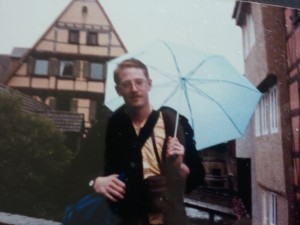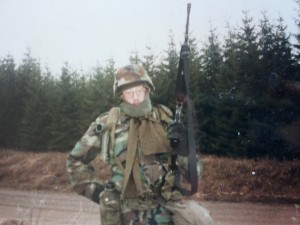Ken Scholes, the author of the yet to be finished PSALMS OF ISAAK, started his writing career with short stories and was the winner of the Writers of the Future Award in 2005.
In one of those short stories he introduced the gypsy king Rudolfo and the metal man Isaak for the first time; both turned out to be formidable protagonists for the novel LAMENTATION (2008) and its sequels. Scholes lives in Oregon with his wife and his twin daughters. In his spare time between dayjob and being a fulltime-Dad, he is busy writing REQUIEM, the fourth volume of the series. Nevertheless he took the time to answer some questions for Bibliotheka Phantastika and he even flipped through his old photo albums.
Bilbiotheka Phantastika: Unlike many other US authors whose works are translated for German readers, you visited Germany once. Would you tell us more about it? What do you associate with Germany?
Ken Scholes: I actually lived in Germany — in the village of Kornwestheim near Ludwigsburg and Stuttgart — from 1986 to 1988. I was a young man stationed there in the US Army and it was one of those life-changing, world-broadening, eye-opening experiences.
At the time, I had given up writing science fiction and fantasy stories and instead used my spare time to learn how to write sermons and religious songs. I was at the very front end of teaching myself guitar at the time so I also spent a lot of evenings singing Simon and Garfunkel and Dylan and John Denver songs on the streets of Stuttgart.
While I was there, of course I also fell in love with a few German girls. And developed a deep, deep fondness for the German people, culture and…food. I spent a lot of weekends with German families, and even spent a few Christmases with those families. I had a great time there and have missed it. I haven’t made it in years, but I do have a spaetzle maker and have never lost my love for jager-schnitzle. I’ll see if I can find some pictures I can share from my time there.
I’m eager to return someday and I’m hoping that my books will not only make that more possible, but that they may also help me find some of the German friends that I’ve lost touch with over the twenty years since I left.
bp: Your books are full of robots, magic, secret societies, various steampunk elements and traditional swordfights; genre definition enthusiasts are at a loss. If you had to make up a genre term for THE PSALMS OF ISAAK, what would it be?
KS: Well, I never really thought much about the genre when I wrote it. I wanted the story to be free to become what it needed to and not be restrained by the various expectations readers have for the genres they enjoy. If I had to call it something, I’d call it post-apocalyptic SF dressed up as fantasy with techno-thriller and mystery tropes thrown in for good measure.
bp: THE PSALMS OF ISAAK are about scheming planned well in advance and events which are the culmination of the influence exerted by a lot of factions and individuals. Do you plan well in advance in writing your novels?
KS: Amazingly enough, I do not. I actually plan very little when it comes to the novels. I’ll think and scheme as I go, pausing here and there in the drafting process to ponder where the story is going. I am fortunate that I am able to work both instinctively and organically, letting the story develop and emerge as I write it…and able to plan my work to some degree largely by working backwards from the ending to reverse-engineer the events that would bring us to that ending.
With the Psalms of Isaak, I’m writing without much in the way of notes or outlines. I’ve only had maps of some parts of that world because readers have wanted them in the books. On my next project, I’ll probably do more world-building and outlining prior to drafting, mostly because I’m curious to try something different. In my short fiction, I think about 2/3 of my stories are spontaneously written by instinct and about 1/3 are thought out and planned a bit.
bp: Your chapters seem to highlight crucial events in an intense way, their strong inner substructure is evident. Did you import your approach as a writer from your short stories to your novels? And have you perhaps in some ways always been a novelist, regarding some of your epic, mythic short stories, e.g. EDWARD BEAR or THE SANTAMAN CYCLE?
KS: This is a great question. I do think I’ve imported this from my short story writing — up until writing Lamentation, I’d only written short stories and novelettes so in a way, I was simply writing what I knew. I wanted the scenes to serve as snapshots in the character’s lives — not necessarily capturing the action, either, but sometimes the consequences of the action or their reaction to it. Because the story, in my mind, isn’t about this horrible thing that is happening to the Named Lands but rather about how people’s lives have been changed by those events and how they’ve responded to them. Everything else feels secondary for me.
bp: Readers keep on wondering: the name ‘Xhum Y’Zir’ seems a little different, considering ‘Rudolfo’, Petronus’ etc. What is the story behind this name? Did you have pity with the last letters of the alphabet?
KS: Ha! I’ve certainly gotten some grief over those letters but the XYZ was an accident. And really, the story of his name is pretty simple. The launchpad for the series was a short story called, “Of Metal Men and Scarlet Thread and Dancing with the Sunrise,” and it was never intended to be more than just a single short story written for a market that wanted tales about mechanical oddities. I didn’t put much thought into any of the names. But for the ancient wizard I referenced, I needed a name that sounded out of place with the rest of my characters and setting…something more exotic. I think I only used it once or twice in the original story but when I sat down to write Lamentation, I kept as much as I could from the original story and never gave it a second thought, never imagining that my first novel would actually sell and then come out around the world. And never imagining that the wizard would lead to a line of wizards going back thousands of years in my world.
bp: Let’s speculate: paralleling religious concepts, ‘Czar’, ‘Pope’, Latin fragments – sometimes the Named Lands seem to refer to our terrestrial history. Does Rudolfo live in a post-post-post-apocalyptic Europe, or did you imagine the Named Lands as detached from our world?
KS: I’m hesitant to answer this one because it’s gradually being answered in the series. But I will say that I’ve intentionally used a patchwork quilt of titles, hierarchies and language to give a sense of familiarity and a sense of human cultures being blended together over vast amounts of time.
bp: In your novel ANTIPHON religion provides spiritual shelter, nourishs or destroys hope. Many characters speak of ‘love’, when they commit crimes most cruel on behalf of their beliefs. Other characters find inner strength in desperate situations. In your opinion, what’s the stronger plot device? Faith or doubt?
KS: I don’t really think in terms of plot devices. I try instead to capture humans as close to “true” as possible and to show our inconsistencies and weaknesses alongside our strengths and graces. Even today, we have people who believe it is an act of love and obedience to their god to strap on a bomb and detonate it in a crowded place…or an act of loyalty and love for their tribe to take up a rifle and help invade some Other tribe’s territory.
I think to capture the full range of humanity’s beautiful ugliness, faith and doubt must both be employed along with love and hate…and to really show just how capable we are good and evil, I think we have to show how easily we can mislead ourselves and others to rationalize and justify horrible behavior in the name of some perceived higher good.
bp: In ANTIPHON, Isaak defies the will of his creator and his human friends (and, by the way, violates the second law of Asimov’s Law of Robotics!). Do you dream of machines that are able to dream? Or do you fear the idea of independent artificial intelligence?
KS: I think I would say that I cautiously dream. Humans have created machines to make our lives easier, take us places we could not go otherwise, do things we could not normally do. I find myself wondering what will happen when we create an intelligence that truly evolves beyond our reach. Will it help us reach the same place? Will it shepherd us and keep us safe from ourselves? And how will we feel about that? How will it change us? I like to play “what if” with these thoughts and some of those thoughts are actually a part of what I’m exploring in the Psalms of Isaak.
bp: In the Fantasy/SF genre the answer to “what if” has nearly no boundaries: not even physical laws or rules of society have to apply, it is the freedom of the writer to create a whole world around a “what if”. Can you name other “What if”s which inspired you and keep your creative mind working?
KS: Absolutely! It’s the question that drives all of my fiction. What if a super hero retired, lost his fortune and had to go into a nursing home? (“Action Team-Ups Number Thirty-Seven”). What if everyone had a personal god who gave them the desire of their hearts? (“That Old Time Religion”). What if a couple of dungeon-crawling D&D characters met, fell in love, and decided to retire from adventuring and raise a family? (“Last Flight of the Goddess.”) What REALLY happened between Cain and Abel…and how did Cain find his wife? (“East of Eden and Just a Bit South”). I could go on and on and on.
bp: The culture of knowledge (both science and arts and humanities) of your world is interesting: scraps of former advanced civilizations lead to a reconstruction at a lower level (for example the ancient and rebuilt mechoservitors), and for 2000 years a powerful authority guarded the remaining knowledge. Do you think the risk of the degeneration of knowledge is real or is it an intentional alternative concept?
KS: I do think it’s real. After all, we’re still not finished piecing together our own ancient history. We’re learning more and more all the time. And in the Psalms of Isaak, the bigger point I’m trying to make is that there are people who feel it is their job to control information in order to protect humanity from itself…but that controlling information and being willing to use that privileged information to maintain that control (as in the case of the Androfrancines) can be one’s undoing.
bp: Why did you choose an ecclesiastic faction as the ideal guardian of knowledge (as Walter Miller jr. did in CANTICLE FOR LEIBOWITZ)?
KS: This may be a place where the translation of the series from English to German has played a bit with my intentions. The Androfrancines are not actually an ecclesiastical faction at their core. Or maybe a better way to say it is that they’re using the trappings. They are secular humanists…scientists, archaeologists, engineers, behaviorists…who have created a religious hierarchy and “deified” humanity’s accomplishments (as the Light) as a means of protecting it by instilling a type of religious awe and zeal. This is part of the backward dream that Petronus grows to see as a lie he can no longer support. With the Androfrancines, I’m playing a great deal in the sandbox of religion used intentionally as a tool to shape a society and to protect survivors (and surviving knowledge) from repeated cataclysm. Whereas with the Y’Zirites, I’m introducing a more evangelical religious movement with blood-letting and ritual scarring at the core of its practices. I thought that contrasting the two different systems in the series would have a more truthful ring than the traditional, more black and white, good-versus-evil types of stories. And it would provide a good stage for the drama to unfold upon.
bp: The Seven Cacophonic Deaths are not entirely destroyed, though they are a threat to everyone. Is the destruction of knowledge more outrageous than everything that may happen if it is at humanity‘s disposal?
KS: I think that’s a fine question. Some knowledge — like the Seven Cacophonic Deaths — could create great harm if those who preserved that knowledge weren’t able to keep it safe. And as long as their were people with nothing to lose, willing to use that awful power…. Well, you can see how it goes. That’s one of the questions I play with in the series. But destroying that knowledge — destroying any knowledge — opens a door to censorship and control. Better to grow into our knowledge and learn to mitigate our propensity for self destruction if we can.
bp: Let‘s move from humanity‘s knowledge to creative savvy: What was it that led you to choose not only the generic old mentor of the hero, but a whole bunch of old or mature men as protagonists (we think of Petronus,Vlad, Lysias, Grymlis, Charles and even Rudolfo, who sees himself „in the middle of his way“)? What narrative opportunities did you see in this decision?
KS: I really didn’t have it at the front of my mind. I wanted to start with some familiar fantasy tropes — the wise and forgotten king, the dashing prince, the courtesan spy, the orphan boy, the queen-in-hiding, the mechanical man/puppet — and then turn those tropes a bit on their heads as the story progressed. I think younger protagonists are the norm and I tried to flesh out my ensemble when it came to gender and age so we have Neb and Winters both in their teens, Jin Li Tam in her early thirties, Rudolfo in his early forties and then a healthy dose of 60 and 70-somethings between Lysias, Grymlis, Charles, Petronus and Vlad Li Tam.
bp: Was it as easy to “convert” the female characters as it was with the male ones? Can you imagine to achieve the same impression by writing about old ladies?
KS: It wasn’t easy, no. I was afraid to write female characters for the longest time. Over the body of my short fiction, women mostly played supporting characters of varying strength and importance to the actual story and I stayed firmly rooted in the head of my male POV protagonists. In a few pieces, I risked writing a female POV protagonist but it usually made me nervous. Mostly, because I was afraid of getting it wrong and angering people. So I stayed close to the types of characters I felt I knew best. Even in LAMENTATION/SUNDENFALL, I really only worked with one female POV protagonist. In CANTICLE/LOBGESANG, I added more. And I’m finding that as I do it, certainly there are things I get wrong but also things I get right. And I’ve found that some of the people who are unhappy about how I write a character — female or otherwise — will tell me in a constructive, helpful way and some will just become angry. And not everyone will even agree. But the short answer is, yes, I think I could achieve the same impression writing about old ladies. And I suspect that in future books and future series, I will tackle just that. At some point, I intend to do a trilogy based on my short story, “Invisible Empire of Ascending Light,” featuring Tana Berrique, a 60-something female protagonist as the lead character in that ensemble cast.
bp: The family theme is a central issue in your novels. Did your own experiences inspire you to write about it or is it a theme you consider to be neglected in speculative fiction? Are there perhaps even some literary or cinematic examples which come to mind, where you would have liked to see this theme fleshed out?
KS: Again, it wasn’t something I set out to do with intent but I think it adds to the ring of truth I aim for in my fiction. In drafting Lamentation, I saw quickly that the introduction of a child to Rudolfo and Jin Li Tam’s life would be a major event in the midst of everything else happening and as that child’s role in the greater saga unfolded, I saw an opportunity to explore the idea even further. What if your child was a messianic figure in an ancient blood cult? It seemed a great exploration. And then, beyond that, digging into the Tam family more also seemed like a great place to explore the bonds of family and just how those bonds could be used to leverage one’s will if you saw your family as your best tool — or weapon — for controlling the world. Love and fear are great motivators for humans. And I do suspect that the love of family often takes a back seat in fiction to romantic love.
I don’t really have any examples where I would’ve liked the theme fleshed out more and as to my own experiences, I definitely think my own family — both the problematic family I was born into and the family that I later chose to have — certainly played into my writing. Because I tend to fuel my writing out of my own life expieriences…the good, the bad and the ugly.
bp: The titles of your novels, the reference to a Paul Simon song in ANTIPHON, the power of song in some of your short stories: music seems to be a leitmotif in your work. What kind of role does music play in your novels? And are you a music lover in real life, too?
KS: First, I have to say that I love the word leitmotif! And yes, I would say that music is definitely a powerful force in not just my writing but in my life. I’ve been a musician and a lover of music for most of my life, teaching myself guitar in my teen years and performing on street corners and church stages at an early age. I was listening to Simon and Garfunkel in my older brother’s room before I have memory and their songs particularly — and Paul Simon’s solo work — have been constant companions to me. Of course, I love just about all music — I think Country Western is the only type I don’t enjoy. And when I write, I nearly always need headphones and music playing in order to find my words.
In the series, I wanted short titles and I wanted to take them from sacred music. Initially, it was Lamentation, Canticle and Requiem when I thought The Psalms of Isaak would be a trilogy. But there is a line at the end of Lamentation that says “Rudolfo saw how a lamentation could become a hymn and understood his part in it.” Somewhere in the revision process of the first book, I realized there would be five and that the last one had to be Hymn based on that passage. The last name to come into place was Antiphon (which is a response to a canticle) for the third volume.
I suspect the re-titling in German has played a bit of havoc here because each book has references throughout that are rooted in the titles I chose but I’m trusting that the gist of my intentions came through.
bp: We are afraid. How sad is REQUIEM going to be?
KS: I won’t lie: There will be some sadness. But just remember that Hymn follows after. Requiem wraps up the last of the second act and launches us solidly into the concluding act of the series. So it has to get a bit worse before it can start to get better. But I hope my German readers will hang on for the ride and that they will continue to enjoy the tale I’m telling.
bp: Thank you very much! We are looking forward to every Hymn and Requiem you are going to write, and everything in between!
For the German translation of the interview and the comments section, please visit our original blog article.






